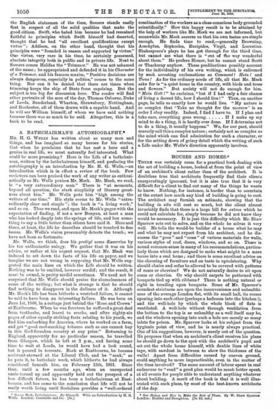A BATHCHAIRMAN'S AUTOBIOGRAPHY.* MR. H. G. WELLS has written about
so many men and things, and has imagined so many heroes for his stories, that when he proclaims that he has met a hero and a genius in real life, we must naturally feel interested. What could be more promising ? Here is the Life of a bathchair- man, written by the bathchairman himself, and prefacing the autobiography is an introduction by Mr. H. G. Wells,—an introduction which is in effect a review of the book. Few reviewers can have praised the work of any writer as enthusi- astically as Mr. Wells praises Mr. Meek. Mr. Meek, we read, is "a very extraordinary man." There is "at moments, beyond all question, the stark simplicity of literary great- ness about him." Mr. Wells puts him "high among the writers of our time." His style seems to Mr. Wells "extra- ordinarily clear and simple " ; the hook is "a living work," and so on. Thus we read, and open Mr. Meek's pages with the expectation of finding, if not a new Bunyan, at least a man who has looked deeply into the springs of life, and has some- thing to say a little better than others have said it. Here and there, at least, the life he describes should be touched to fine issues. Mr. Wells's vision presumably detects the touch; we have not been so fortunate.
Mr. Wells, we think, does his prot6g6 some disservice by his too enthusiastic eulogy. We gather that it was on his advice, or rather at his urgent request, that Mr. Meek was induced to set down the facts of his life on paper, and we imagine we are not wrong in supposing that Mr. Wells sug- gested the main lines on which the Life should be written. Nothing was to be omitted, however sordid; and the result, it must be owned, is pretty sordid sometimes. We need not be surprised that Mr. Wells should praise the shamelessness of some of the writing ; but what is strange is that he should find nothing to disapprove in the dullness of it. Although Mr. Meek's life has been hitherto a wretched failure, it cannot be said to have been an interesting failure. He was born on June 1st, 1868, in a cottage just behind the 'Rose and Crown' at Eastbourne. When he was fourteen he suffered a great deal from toothache, and learnt to smoke, and after eighty-six pages of other equally striking facts relating to his youth, we find him embarking for America, where he worked on a farm, and got " good cool-smoking tobacco such as one cannot buy in this God-forsaken country at any price." Returning to England, apparently for no particular reason, he travelled from Glasgow, which he left at 2 p.m., and having some time to wait at Leeds, be would have had a look round, but it poured in torrents. Back at Eastbourne, he became assistant-steward at the Liberal Club, and he "sank," as lie puts it, to bathchair work, which hitherto he had always considered beneath him, on February 13th, 1891. Since then, until a few months ago, when an unexpected uncle turned up and apparently held out the prospect of a less difficult future, he has been a bathchairman at East- bourne, and has come to the conclusion that life will not be really worth living until Socialism provides a "well-ordered
George Meek, BzOichairman. By Himself. With an Introduction by H. G. Wells. London: Constable and Co. [Gs.]
combination of the workers as a class-conscious body grounded scientifically." How this happy result is to be attained by the help of workers like Mr. Meek we are not informed, but meanwhile Mr. Meek assures us that his own tastes are simple enough. He finds time to read,—generally Browning, Aeschylus, Sophocles, Euripides, Virgil, and Lucretius. Shakespeare's plays he has got through for the third time, but cannot see what there is "out of the way wonderful about them." He prefers Homer, but he cannot stand Scott or Thackeray anyhow. These predilections possibly account for the individuality of his own writing, which is enlivened by such arresting exclamations as Ccrmanent ! Hein ! and Tiens ! As for the ordinary needs of life, all that Mr. Meek asks for is "a quiet home in the country, with birds and trees and flowers." But society will not do enough for him. "Mein Gott !" he exclaims, "but if I had only a fair chance of living a decent life, how I should live ! " Then, on another page, he tells us exactly how he would live. " My nature is so complex that Take no thought for the morrow' is an order I obey readily. Indeed, I find I have to. If I plan and take care, everything goes wrong If I make up my mind to do a thing, it is hardly ever done. If I determine not to do a thing, it usually happens." We, for our part, should scarcely call this a complex nature ; certainly not so complex as the mind which can find admiration for such a character, or for the setting down of grimy detail which the writing of such a Life under Mr. Wells's direction apparently involves.






















































 Previous page
Previous page